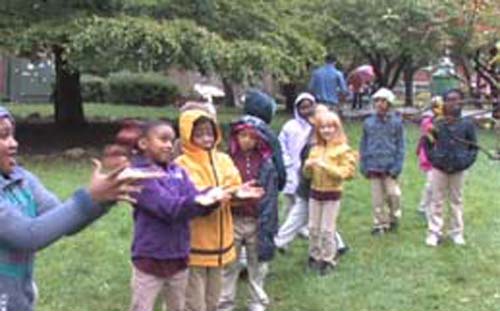REVIEW: Schools That Change Communities
Schools That Change Communities a film by Bob Gliner is worth watching by everyone who is concerned about the future of public education in the USA. This is about good things that are happening in the schools.
 Schools that change communities. Susan Notes: Schools That Change Communities a film by Bob Gliner 58 minutes Watch the trailer and order the film here.
Schools that change communities. Susan Notes: Schools That Change Communities a film by Bob Gliner 58 minutes Watch the trailer and order the film here.
Rejoice. Here's a film about good things happening in schools.
A celebration of place-based education, Bob Gliner's film will lift your hearts — and your will to combat the regimented, standardized offal that Bill Gates has bought for the schools.
From primary graders in the Mattapan section of Boston learning about their neighborhoods to high schoolers in Watsonville, California documenting their community, these kids don't have to ask, "Why am I learning this?" They know. And so do their communities, which become such a vital part of the education exchange. That's the whole point, really, getting schoolkids connected in very real ways to their communities.
When high schoolers in Howard, South Dakota decided to take on the issue of getting people to spend money at home rather than traveling elsewhere, one girl wrote Senator Daschle for help. Everybody was amazed that he came in person. What astonished the student was "He took the time to listen."
It's a poignant moment, one I replayed several times. Students aren't used to anybody listening.
The whole school reform movement could be turned on end if people would listen more. Really listen.
People in Howard, South Dakota took the students' words to heart--because all the subject area teachers participated in this place-based learning effort to reinvigorate the town. And some of the results turn out to be "cutting edge" technology.
In Cottage Grove, Oregon, students at Kennedy Alternative High School are involved in the sustainability of the surrounding environment, and in Watsonville, California they are interviewing people in the town--migrant workers, the Salvation Army, the mayor, and lots of others--trying to learn about the economic problems and what they can do. As one student says, "There is a problem and we need to help fix it."
Cottage Grove students spend a few days out in the field and this experience energizes their studies back in the classroom. As an administrator says, "These studies aren't easier; they're different." So when students are learning math skills through their work on a wetland mitigation project, they see real problems, not just textbook math problems.
A profound comment made in Watsonville, where 50% of the population do not have high school diplomas: Teachers discover they have a voice ... seeing themselves as people who can effect change in the system.
And how many teachers do you know who have said that lately?
"The neighborhood" is a common curriculum theme for primary graders, but in Mattapan children learn that "a neighborhood is not just where we live." Learning about civic engagement and "not to be a bystander" is an essential part of the pedagogy. Children interview adults, learning that "everybody has a story." At the end of the year the children create a professional quality radio program.
This film is about how schools can — and should — be critical parts of the surrounding communities. It is about students and teachers learning they have value. It is about students and teachers getting up from their desks and doing important work.
My advice is to buy two copies of this film, one for your local school board and one for your PTA. Write a letter to your local paper, advocating that they see the film as a first step to getting place-based learning in your community.
Write and tell members of the House and Senate Education Committees about it. We have schools doing good things, and this film highlights a few of them.
— Susan Ohanian, film review
docmakeronline.com
http://www.docmakeronline.com/schoolsthatchangecommunities.html

